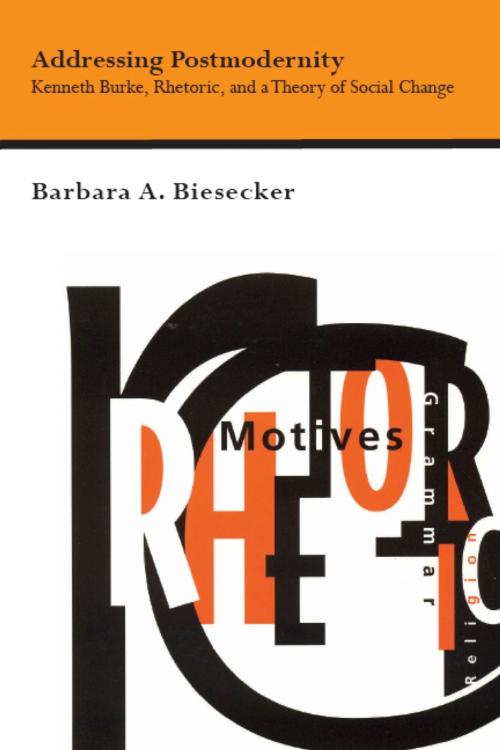Addressing Postmodernity
Kenneth Burke, Rhetoric, and a Theory of Social Change
Nonfiction, Reference & Language, Language Arts, Public Speaking, Rhetoric, Fiction & Literature, Literary Theory & Criticism, Theory| Author: | Barbara Biesecker | ISBN: | 9780817382599 |
| Publisher: | University of Alabama Press | Publication: | September 15, 2009 |
| Imprint: | University Alabama Press | Language: | English |
| Author: | Barbara Biesecker |
| ISBN: | 9780817382599 |
| Publisher: | University of Alabama Press |
| Publication: | September 15, 2009 |
| Imprint: | University Alabama Press |
| Language: | English |
Biesecker reveals the full range of Kenneth Burke's contribution to the possibility of social change.
In Addressing Postmodernity, Barbara Biesecker examines the relationship between rhetoric and social change and the ways human beings transform social relations through the purposeful use of symbols. In discerning the conditions of possibility for social transformation and the role of human beings and rhetoric in it, Biesecker turns to the seminal work of Kenneth Burke.
Through a close reading of Burke's major works, A Grammar of Motives, A Rhetoric of Motives, and The Rhetoric of Religion: Studies in Logology, Biesecker addresses the critical topic of the
fragmentation of the contemporary lifeworld. As Biesecker shows, postmodernity will have a major impact on Burkeian scholarship and on the rhetorical critique of social relations in general.
Biesecker confronts directly the challenges posed by postmodernity to social theorists and critics alike. In juxtaposing the work of Burke and Jurgen Habermas, Biesecker argues that a radicalized rereading of Burke's theory of the negative opens the way toward a resolutely rhetorical theory of social change and human agency.
Biesecker reveals the full range of Kenneth Burke's contribution to the possibility of social change.
In Addressing Postmodernity, Barbara Biesecker examines the relationship between rhetoric and social change and the ways human beings transform social relations through the purposeful use of symbols. In discerning the conditions of possibility for social transformation and the role of human beings and rhetoric in it, Biesecker turns to the seminal work of Kenneth Burke.
Through a close reading of Burke's major works, A Grammar of Motives, A Rhetoric of Motives, and The Rhetoric of Religion: Studies in Logology, Biesecker addresses the critical topic of the
fragmentation of the contemporary lifeworld. As Biesecker shows, postmodernity will have a major impact on Burkeian scholarship and on the rhetorical critique of social relations in general.
Biesecker confronts directly the challenges posed by postmodernity to social theorists and critics alike. In juxtaposing the work of Burke and Jurgen Habermas, Biesecker argues that a radicalized rereading of Burke's theory of the negative opens the way toward a resolutely rhetorical theory of social change and human agency.















